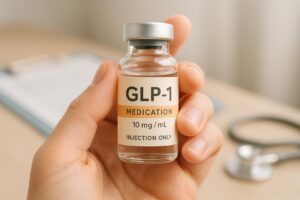How Long Does GLP-1 Stay in Your System? Understanding the Duration and Impact of GLP-1 Medications

Imagine this: you’ve been diligently following your weight loss program, feeling great with the help of GLP-1 receptor agonists, and suddenly, life throws a wrench in your plans. You miss a dose, or perhaps you need to pause your medication for a while. This can leave you wondering about the implications. How long does GLP-1 stay in your system, and what does that mean for your weight loss journey?
In recent years, GLP-1 medications like semaglutide (found in brands such as Ozempic® and Wegovy®) have gained prominence for their effectiveness in managing weight and improving metabolic health. They work by mimicking a natural hormone in our bodies that regulates appetite and glucose levels. Understanding how long these medications remain active in your system is crucial for anyone considering or currently utilizing them.
In this blog post, we will explore the duration that GLP-1 medications stay in your system, the factors influencing this duration, and the implications for your health and weight loss efforts. By the end, you will have a clearer understanding of how to manage your treatment effectively and what to expect if you need to pause or miss doses.
The Basics of GLP-1 Medications
What Are GLP-1 Medications?
GLP-1 (glucagon-like peptide-1) receptor agonists are a class of medications designed to mimic the effects of the naturally occurring hormone GLP-1 in the body. They play several roles, including:
- Increasing insulin secretion in response to meals, which helps lower blood sugar levels.
- Slowing gastric emptying, which contributes to a feeling of fullness or satiety.
- Reducing appetite, making it easier for individuals to manage their food intake.
These actions make GLP-1 medications particularly beneficial for individuals struggling with obesity or type 2 diabetes. Available as injectables (like Ozempic® and Wegovy®) and oral formulations (like Rybelsus®), they offer various options tailored to individual preferences and needs.
Common GLP-1 Medications
At TrimRx, we focus on providing personalized weight loss solutions, and GLP-1 medications play a significant role in our offerings. Some of the key medications include:
- Semaglutide: Available as an injectable (Ozempic® and Wegovy®) and oral (Rybelsus®) option, semaglutide is widely recognized for its effectiveness in weight management.
- Tirzepatide: Another promising GLP-1 medication that combines GLP-1 and GIP (gastric inhibitory polypeptide) mechanisms to enhance weight loss and metabolic health.
- Mounjaro® and Zepbound®: These medications represent newer entrants in the GLP-1 market, with ongoing studies assessing their long-term effects and benefits.
The Importance of Understanding Duration
Understanding how long GLP-1 medications remain in your system is essential not only for effective weight management but also for overall health. It can help you:
- Plan for missed doses: Knowing the medication’s duration helps you understand what happens if you miss a dose or need to pause treatment.
- Manage side effects: Being aware of how long the effects last can help you anticipate potential changes in appetite or blood sugar levels.
- Coordinate medical care: If you need surgery or other medical procedures, knowing the medication’s presence in your system is vital for safe management.
How Long Does GLP-1 Stay in Your System?
Half-Life of GLP-1 Medications
The half-life of a medication is the time it takes for half of the drug to be eliminated from the body. For GLP-1 receptor agonists, this varies by specific medication:
- Semaglutide: The average half-life is approximately 7 days, meaning it takes about a week for half of the drug to be cleared from your body. For most individuals, semaglutide can remain detectable in the system for about 4 to 5 weeks after the last dose.
- Tirzepatide: While detailed half-life data is still emerging, initial studies suggest it may also have a similar duration in the body.
- Oral GLP-1 medications: Generally, the oral formulations have comparable half-lives, though individual metabolic rates can influence this duration.
Implications of Half-Life
The half-life has direct implications for how you experience the effects of the medication:
-
Diminished Effectiveness: While the medication might stay in your system for weeks, its appetite-suppressing effects typically decrease significantly after about a week. This is why consistent dosing is crucial for maintaining weight loss.
-
Side Effects Management: If you miss doses or stop taking the medication, you may experience increased hunger and potential weight regain. Research indicates that individuals who cease taking semaglutide may regain a portion of their lost weight within months.
-
Medical Considerations: If you need to undergo a medical procedure, it’s essential to inform your healthcare provider about your GLP-1 use. The medication’s presence can affect anesthesia and other medications used during your treatment.
Factors Influencing Duration in the Body
Several factors can affect how long GLP-1 substances remain in your system, including:
1. Dosage and Administration Frequency
Higher doses or more frequent administration can lead to a longer duration of the drug in your system. Your healthcare provider will tailor your dosage based on your specific weight loss goals and medical history.
2. Metabolic Rate
Individual metabolic rates vary widely. Factors such as age, overall health, and metabolic conditions can influence how quickly your body processes and eliminates medications. For instance, younger individuals typically have faster metabolisms, which may lead to quicker clearance.
3. Kidney Function
Kidney function plays a critical role in drug clearance. Individuals with compromised kidney function may experience a prolonged presence of GLP-1 medications in their system, as their bodies may not eliminate the drug as effectively.
4. Body Weight and Composition
Body weight can also impact the distribution and clearance of medications. Heavier individuals may retain medications longer due to a larger volume of distribution in body tissues.
5. Concurrent Medications
If you are taking other medications, they can interact with GLP-1 medications, affecting their metabolism and clearance. Always inform your healthcare provider of any other medications, supplements, or over-the-counter drugs you are taking to avoid potential interactions.
Managing Your Treatment Effectively
Understanding how long GLP-1 medications stay in your system enables you to make informed decisions about your treatment. Here are some practical tips:
1. Stay Consistent with Dosing
Adhering to the prescribed dosing schedule is crucial. If you miss a dose, take it as soon as possible unless it’s almost time for your next scheduled dose. Never double up on doses, as this can lead to adverse effects.
2. Monitor Your Health
Regularly monitoring your weight, blood sugar levels, and overall health can provide vital insights into how well the medication is working for you. Keeping a health journal may help you track any changes.
3. Communicate with Your Healthcare Provider
Regular check-ins with your healthcare provider are essential. Discuss any side effects, missed doses, or concerns you may have about your treatment. Your provider can help adjust your dosage or treatment plan as needed.
4. Maintain a Healthy Lifestyle
Incorporating a balanced diet and regular physical activity is crucial for reinforcing the effects of GLP-1 medications. Focus on whole foods, plenty of fruits and vegetables, and consistent exercise to support your weight loss journey.
5. Utilize TrimRx Resources
At TrimRx, we offer a comprehensive service that includes personalized weight loss assessments and ongoing support. If you’re considering GLP-1 medications, we encourage you to take our free assessment quiz to see if you qualify for our prescription weight loss medications.
- Take our free assessment quiz: Start here.
6. Consider Quick-Access Supplements
In addition to GLP-1 medications, we offer quick-access supplements to support your weight loss journey. Our GLP-1 Daily Support and Weight Loss Boost can complement your efforts.
- Explore GLP-1 Daily Support: Learn more.
- Check out Weight Loss Boost: Get it here.
Conclusion
Understanding how long GLP-1 medications stay in your system is a vital aspect of managing your weight loss journey. With a half-life of about 7 days, these medications can remain active in your body for several weeks, but their appetite-suppressing effects diminish after about a week.
Factors such as dosage, metabolic rate, kidney function, and body weight all contribute to how long the medication affects you. By staying consistent with your treatment, monitoring your health, and communicating with your healthcare provider, you can optimize your weight management efforts.
At TrimRx, we are committed to helping you achieve your weight loss goals through personalized, medically supervised care. Together, we can navigate your journey toward a healthier lifestyle.
FAQs
How many days does GLP-1 medication stay in your system?
GLP-1 medications stay in your system for 5-7 weeks depending on type, according to understanding the duration and impact of elimination. TrimRx educates on understanding the duration different GLP-1 options stay in your system, explaining the impact of half-life variations among medications.
Does GLP-1 leave your system quickly after stopping?
No, GLP-1 medications stay in your system slowly over weeks rather than days, with understanding the duration crucial for impact assessment. TrimRx clarifies understanding how long the duration is that GLP-1 stays in your system, teaching about the impact of gradual elimination.
How long does weekly GLP-1 stay in your system?
Weekly GLP-1 formulations stay in your system approximately 4-7 weeks, based on understanding the duration and assessing impact after discontinuation. TrimRx explains understanding the duration weekly GLP-1 stays in your system, noting the impact of extended-release formulations.
Will side effects continue while GLP-1 stays in your system?
Yes, side effects persist while GLP-1 stays in your system until elimination completes, according to understanding the duration and impact. TrimRx monitors understanding how the duration GLP-1 stays in your system affects the impact of ongoing side effects post-treatment.
What happens when GLP-1 leaves your system?
As GLP-1 leaves your system, appetite returns and weight regain may occur, with understanding the duration and impact essential for planning. TrimRx prepares patients for understanding the duration and impact when GLP-1 stays in your system less each week following discontinuation.
Does GLP-1 stay in your system longer at higher doses?
Dose affects how long GLP-1 stays in your system slightly, though understanding the duration and impact differences remain modest. TrimRx clarifies understanding how the duration GLP-1 stays in your system relates to dosing, noting minor impact variations.
How do you clear GLP-1 from your system faster?
You cannot significantly speed how quickly GLP-1 leaves your system, with understanding the duration fixed by metabolism and impact predetermined. TrimRx explains understanding that the duration GLP-1 stays in your system follows biological timelines regardless of attempted impact acceleration.
When can I start another medication after GLP-1 leaves my system?
Start new medications once GLP-1 stays in your system minimally after 4-6 weeks, with understanding the duration and impact overlap risks. TrimRx determines understanding safe timing for transitions, evaluating when the duration GLP-1 stays in your system creates minimal impact.
Does GLP-1 staying in your system affect future treatments?
GLP-1 staying in your system can affect new medication starts, making understanding the duration and impact important for treatment planning. TrimRx considers understanding how the duration GLP-1 stays in your system impacts the timing and effectiveness of subsequent therapies.
How long until appetite changes when GLP-1 leaves your system?
Appetite returns within 1-3 weeks as GLP-1 stays in your system less, with understanding the duration and impact of hunger restoration. TrimRx prepares patients for understanding the duration and impact as GLP-1 gradually stays in your system at lower concentrations.
Do different GLP-1 medications clear at different rates?
Yes, short-acting daily formulations clear within days while long-acting weekly versions take weeks. Medication type significantly impacts elimination timelines and offset of effects.
Can liver or kidney problems affect clearance time?
Impaired organ function may slow medication elimination, though most patients experience minimal clinically significant differences. Severe dysfunction warrants provider discussion about clearance expectations.
Will benefits disappear immediately when medication clears?
Therapeutic effects gradually diminish as medication concentration decreases. Weight maintenance and appetite control fade progressively rather than stopping abruptly.
Does body weight affect how long medication stays present?
Body size has minimal impact on elimination timing for these medications. Clearance depends more on liver and kidney function than body mass or composition.
Can I test to see if medication is still in my system?
Specialized blood tests can detect medication presence, though routine clinical use is uncommon. Symptom monitoring usually provides adequate indication of medication status without formal testing.

Transforming Lives, One Step at a Time
Keep reading
Tracking Progress With GLP-1: What To Measure
Learn which metrics to track on GLP‑1 therapy—weight, waist, blood sugar, lipids, side effects, and non‑scale wins—and how often to monitor them.
Fatigue Solutions for Ozempic and Wegovy Users
Hydration, protein-rich meals, light activity, and better sleep can reduce medication-related fatigue and help maintain energy during weight-loss treatment.
GLP-1 Medication Side Effect Checker
Worried about GLP-1 medication side effects? Use our free checker for Semaglutide, Liraglutide, and more to learn what to expect and stay informed!



